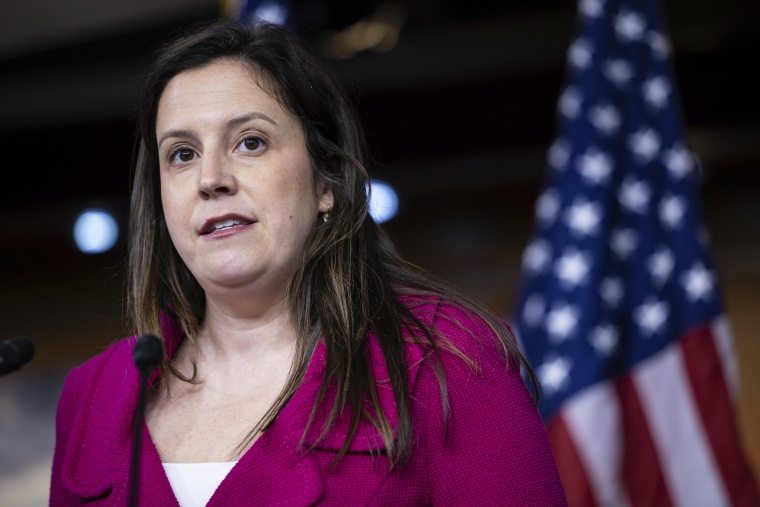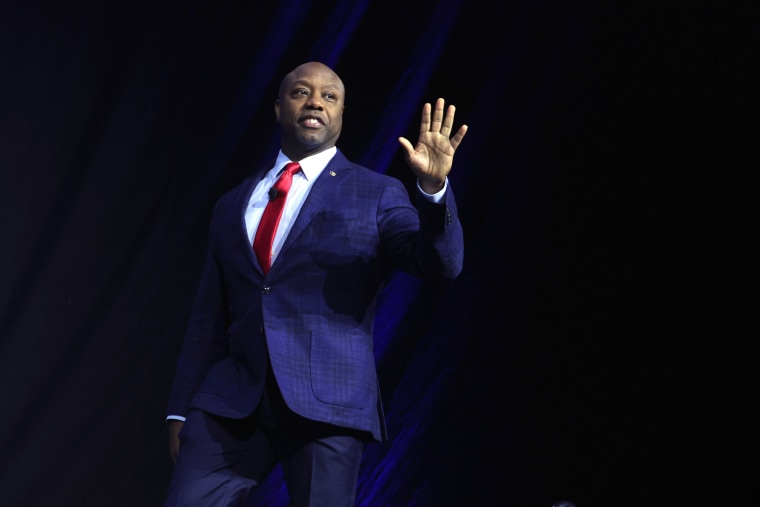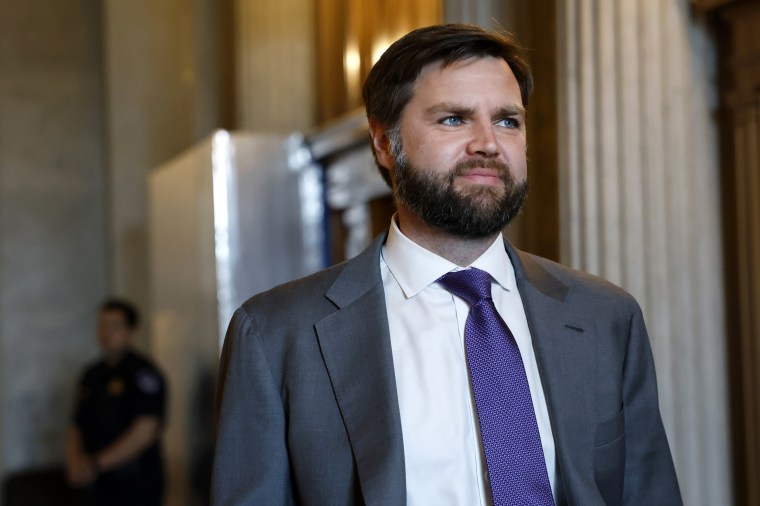GOP VP hopefuls in Congress burnish their credentials while currying favor with Trump

WASHINGTON — For congressional leaders, weekly press conferences are a time to outline a policy agenda, communicate a message and drive a contrast with the opposition party.
For House Republican Conference Chair Elise Stefanik, a vice presidential hopeful, they’re also an opportunity to get in front of a TV camera and shower praise on Donald Trump.
“America is rallying in support of President Trump to save America and fire Joe Biden,” Stefanik, R-N.Y., told reporters in her opening remarks at a recent press conference, congratulating him for winning a primary contest before pivoting to legislative business.
Stefanik has also used her perch on the House’s education committee to tap into the conservative zeitgeist by confronting college presidents during televised hearings, fueling several resignations amid campus protests over Israel and Gaza.

And she isn’t alone. Other vice presidential prospects like Sen. J.D. Vance, R-Ohio, Sen. Marco Rubio, R-Fla., Sen. Tim Scott, R-S.C., and Rep. Marjorie Taylor Greene, R-Ga., are also using the opportunities afforded to them in Congress to burnish their credentials to appeal to Trump. That includes using their vote cards, committee seats, procedural tools and — perhaps most importantly — their ability to get on TV to speak to an audience of one.
“He understands the devil’s in the details. So he puts his brilliant daughter-in-law in charge of our RNC apparatus,” Scott said on Sean Hannity’s Fox News show after Trump installed Lara Trump as new co-chair of the Republican National Committee.
“At the end of the day, you want the ball in the hands of the best player on the field. That player is Donald Trump,” he added in what came across as a thinly veiled VP audition tape.
For decades, Capitol Hill has been a powerful launching pad for vice presidential nominees. In the last 20 years, six of the eight chosen were sitting members of Congress. A seventh, Mike Pence, was a former member turned Indiana governor. Going back to 1992, nine of 10 running mates had experience serving in Congress (the exception was Sarah Palin, the Alaska governor, in 2008).
Sen. Tim Kaine, D-Va., who was Hillary Clinton’s vice presidential pick in 2016, said the nature of the GOP jockeying on Capitol Hill is “different” than it was in the past.
“Normally, being too bold about your ambition is probably not a good thing. But Donald Trump’s not the normal guy. So I think the jockeying is very unusual, but it’s kind of in character with what people understand about Trump,” Kaine said in an interview. “The way to impress him is not by being a dutiful soldier who just keeps your head down and works. The way to impress him is to really flatter him and suck up to him.”

Greene, the far-right congresswoman who has indicated interest in being VP, has sought to curry favor with Trump by engaging in a weekslong push to oust House Speaker Mike Johnson, R-La., accusing him of betraying the GOP and the MAGA movement. Her push failed Wednesday as a vast majority of Republicans and Democrats voted to shoot down her motion. Trump largely steered clear of the melee, offering words of support to both sides.
“I absolutely love Marjorie Taylor Greene,” Trump said on social media after the vote closed, while adding that it was “not the time” for her motion to vacate the speaker’s chair.
Vance, a former Trump critic turned staunch ally who was first elected in 2022, has toured the Sunday show circuit to align with a central theme of Trump’s campaign: that Congress shouldn’t have certified the 2020 election for Biden, even though he won.
“If I had been vice president, I would have told the states — like Pennsylvania, Georgia and so many others — that we needed to have multiple slates of electors and I think the U.S. Congress should have fought over it from there,” Vance said recently on ABC’s “This Week.” “That is the legitimate way to deal with an election that a lot of folks, including me, think had a lot of problems in 2020.”
By contrast, Rubio and Scott voted with the vast majority of the Senate to certify Biden’s win in the hours after police cleared the Jan. 6 rioters out of the Capitol. Stefanik and Greene were among 139 House Republicans who voted to overturn the 2020 result.
Trump’s election denial claims have been a central theme of his campaign as he promises revenge against his foes. Scott and Rubio have taken note. Scott repeatedly refused to say this month on NBC’s “Meet The Press” whether he’d accept the result of the 2024 election. Rubio said on ABC that some Jan. 6 defendants have been “egregiously charged” for trespassing onto the Capitol grounds.
Vance has also carved out a niche as an outspoken opponent of U.S. assistance to Ukraine, aligning with many Trump voters.

A recent vote on a package of aid to Ukraine and Israel highlighted divisions. Vance and Rubio voted against it, while Scott came out in favor of it but missed the vote. In the House, where the bills were broken up, Stefanik voted to help Israel but not Ukraine. Greene voted against both measures.
In his statement, Scott took a swipe at Biden: “The effort of Congress to support our allies should be applauded, but President Biden’s foreign policies have been an utter failure.”
Rubio’s “no” vote on aid to Ukraine and Israel highlights his evolution since 2016, when he presented himself as an outspoken foreign policy hawk who favors an active U.S. role in shaping world affairs. Critics accuse Rubio of pandering to MAGA-style nationalism, but Rubio’s allies say his views reflect changing realities in the U.S. and around the world.
Among the rumored VP contenders this year, Rubio has been less bombastic about Trump and instead leaned on his legislative resume. He has used his perch as the top Republican on the Intelligence Committee to highlight his hawkish approach to China, including as an early proponent of legislation to ban TikTok, a popular app owned by a Beijing-based company that answers to the Chinese Communist Party. Allies note that he helped shape parts of the 2017 tax cuts, Trump’s main domestic achievement as president.
Part of the appeal of Rubio and Scott is that both are well-liked by Republican donors who are skeptical of Trump and his MAGA movement. That’s less true of Vance and Greene.
But Rubio is also cautious to avoid criticizing Trump and quick to dismiss questions from reporters about his controversial or offensive statements. He appears conscious of Trump’s red line not to grant any legitimacy to the dozens of criminal charges he’s facing. Rubio has even endorsed Trump’s sweeping claims of presidential immunity from prosecution for potentially committing crimes.
“Hillary said to me, ‘There’s better political picks than you but if something happens to me, you would be a good president.’ That’s not the way that Donald Trump is going to approach this,” Kaine said. “He’s going to approach it as: ‘Who will be the most loyal to me?’ When it seems like, to be in the running, you can’t even say you’ll abide by the election outcome? That’s pretty dangerous.”







